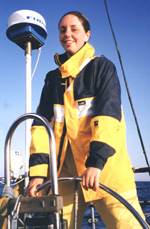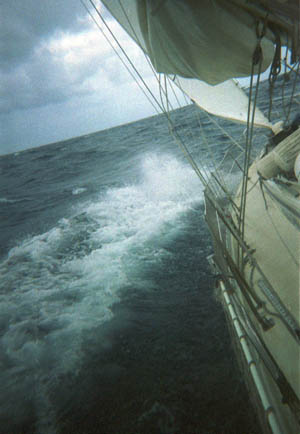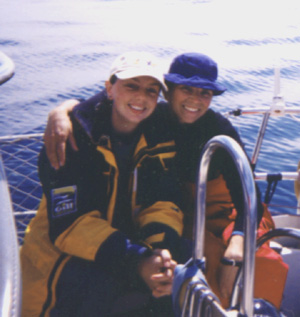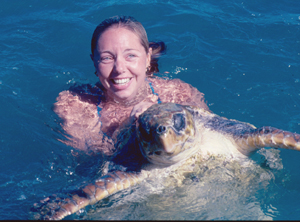|
 Amanda Coakes
Amanda Coakes
|
Biology Department
Dalhousie University
Halifax, Nova Scotia
B3H 4J1
Tel: (902) 494-3723
E-mail:acoakes@dal.ca
|
I am currently a Master's Student in the Whitehead Lab at Dalhousie University
in Halifax, Nova Scotia. I was born and raised here in Halifax and completed my honours degree at
Dal as well. My honours topic was conducting photo-identification of fin whales off the coast of
Halifax and my supervisor was Dr. Shannon Gowans.
I now study the social structure of sperm whales found off the coast of Northern Chile. In
addition to examining the social structure of groups of females and immatures, I have the
opportunity to study how mature male sperm whales interact with these groups. This work has allowed
me plenty of opportunity to travel and for this project I have conducted fieldwork in both Chile and
the Galapagos Islands.

Field Research in Chile
The data for my thesis were collected during a year long field season off the Coast of Northern
Chile. Luke Rendell sailed our supervisor's vessel, Balaena from Halifax to Chile where they
stayed for 10 months. I was there for a portion of the season and we collected several pieces of
information. We located and followed sperm whales using hydrophones, both day and night. We
collected acoustic, photographic and behavioural data as well as skin and feacal samples. The crew
consisted of 4-6 people and we lived on board for about 3 weeks at a time.

Smooth Sailing in the North Atlantic
As part of the research of another master's student in the lab, Tonya Wimmer, I
sailed on Balaena from North Carolina to Halifax. We followed the 1000m contour,
looking for bottlenose whales. Although we didn't find any, we found at least one
cetacean every day. This trip was plagued with mechanical problems and poor Balaena
ended up needing a new transmission. So for most of the trip we were without engine
power and relied on the wind. Of course, during this time we had the calmest seas
ever, with hardly any wind!

Field Research in the Galapagos Islands
My supervisor, Hal Whitehead, has been working in the Galapagos Islands for several years. He has a
photographic catalogue of about 1800 individuals from this area. In 2002, I went to the Islands with
a field assistant and friend, Jen Covello. We were there to continue the photo-identification work
and therefore keep the catalogue up to date. Interestingly enough, although the area has been known
for the groups of female sperm whales found in the deep waters around the islands, we didn't find a
single female, only mature males.

A hiatus in Australia
Late summer, 2002, I went to Shark Bay, Western Australia, as a field assistant. My friend and
labmate, Lars Bejder, conducts work on dolphins in Shark Bay and I went to help for 2 months. There,
I helped collect acoustic recordings as well as identification photos of the bottlenose dolphins in
Shark Bay. In addition to the dolphin work, we were also involved in a sea turtle tagging program.
Green turtles and the endangered loggerhead turtles are relatively common in the shallow bay, which
provides researchers with this tagging opportunity.
Publications and Presentations
Jaquet, N., Gendron, D. and A. Coakes. (in press) Variability of food resources and its influence on
movements, residency and behaviour of sperm whales in the Gulf of California (Mexico). Marine Mammal
Science.
Coakes, A., Gowans, S., Simard, P., Giard, J., Vashro, C., and R. Sears. (in prep).
Photo-identification of fin whales (Balaenoptera physalus) off the coast of Halifax in 1997.
Coakes, A., Gowans, S., Simard, P. and J. Giard. 2000. Fin Whales: Where do they go? Poster
presentation at the 13th Biennial Conference on Marine Mammals. Vancouver, Canada.
Top of the Page


This page was designed by Amanda Coakes
Created: Apr 11, 2003
Last Updated: Apr 15, 2003
 Amanda Coakes
Amanda Coakes
 Amanda Coakes
Amanda Coakes




